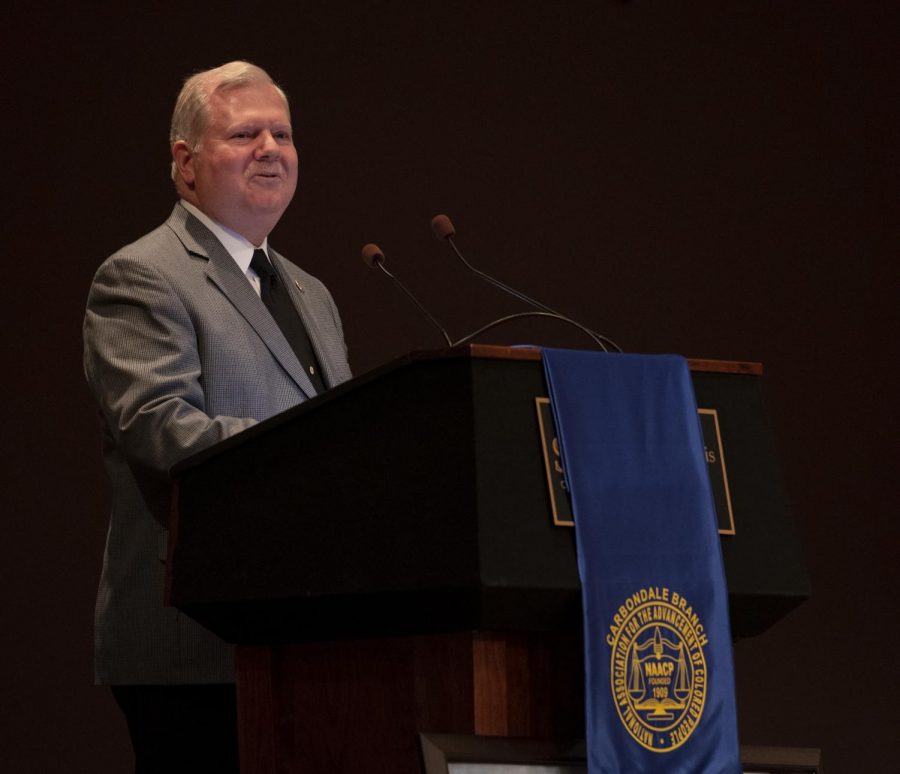Echols honored for posthumous exoneration efforts by Carbondale NAACP at MLK Breakfast
Carson VanBuskirk | @CarsonVanbDE
Paul Echols, retired police lieutenant and criminal justice professor, speaks after receiving honor from the Carbondale NAACP on Monday, Jan. 21, 2019, at the 37th Annual King Breakfast in the SIU Student Center. Echols helped Grover Thompson receive posthumous clemency after Thompson was wrongfully convicted of murder. When asked why he sought to clear Thompson’s name after so long he quoted Dr. Martin Luther King Jr. saying, “The time is always right to do what is right.”
January 21, 2019
Paul Echols, a retired police lieutenant and criminal justice professor, was honored Monday for helping gain clemency for Grover Thompson, a wrongly convicted black man, in a decades old murder case.
Thompson was granted clemency on Jan. 11– 23 years after he died in a southern Illinois prison. He was wrongfully convicted for the attempted murder of Ida White, a widow living in the apartment across the street from the post office where Thompson was sleeping.
“Echols, who interrogated the serial killer and heard the serial killer’s confession, worked for more than a decade to clear Thompson,” said Roy Mazuchowski, vice president for the Carbondale branch of the NAACP.
Advertisement
Mazuchowski said former Illinois governor Bruce Rauner denied a clemency request filed on Thompson’s behalf in 2015 by Echols.
“Three years ago I stood at this podium asking for your help in exonerating Thompson and many of you responded by sending letters to the governor,” Echols said. “I doubt we could’ve done this without your help.”
Former Illinois Gov. Bruce Rauner granted posthumous clemency to Grover earlier this month – days before he left office.
Flowers said the desire to keep going and make a difference for one person is very altruistic.
“Because of his struggle in righting a wrong, he deserves this award,” said Linda Flowers, president for the Carbondale chapter of the NAACP. “It’s a lesson for all of us on standing for what you believe [in] and never giving up.”
Mike Henry, mayor of Carbondale, commended Echols’ efforts during the ceremony.
“He saw an injustice and just never gave up,” Henry said. “He has pictured it for a long, long time. He deserves all of the congratulations and honors we can give him.”
Advertisement*
Echols said while the recognition is flattering, it’s also a bittersweet experience but he feels good knowing he was able to relieve some of the Thompson family’s pain.
“In most exonerations, you get to watch the person walk out of prison and regain their freedom and that’s not possible in this particular case because Thompson died in 1996 but there is nothing you can do about that except learn from it,” Echols said.
Detective Jim Smith, from Cape Girardeau and Echols sat and listened to Tim Krajcir confess to multiple murders because he was set to receive the death penalty if he didn’t, Echols said.
One of the murders Krajcir recalled was the stabbing of a Mt. Vernon woman. With the help of Carly O’Keefe, a reporter for KFVS-TV, she and Echols were able to piece together what happened.
After working for nearly two years with the Innocence Project, including SIU School of Law externs who worked for the group, he was able to get a date before the Illinois Prison Review Board.
“Many of us went to Springfield [and] we testified – it was unopposed and then sat for another several years because Rauner came in,” Echols said.
The family received a one-sentenced letter stating Rauner had denied the exoneration request in Dec. 2015, Echols said.
“It was frustrating, there was no reason for that, but they don’t have to give you an excuse,” Echols said.
Echols said the entire situation was a rollercoaster and while it was a victory, he wished it came sooner.
“Why couldn’t it have been many years ago?” Echols said. “Thompson could’ve got out of prison and enjoyed his freedom again.”
Thompson received the first posthumous exoneration in Illinois history and the 21st such exoneration nationwide, according to the Illinois Innocence Project at the University of Illinois Springfield.
Advertisement








